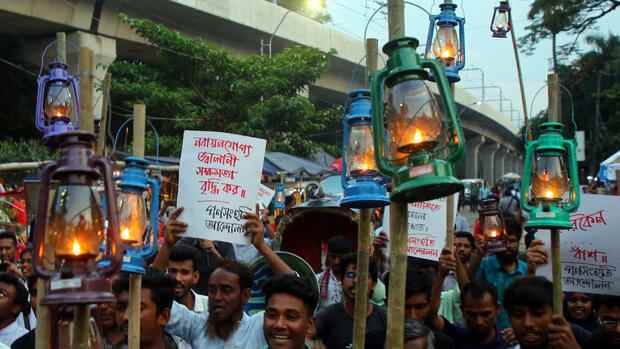In Bangladesh’s capital Dhaka, people demonstrate against the lack of electricity.
(Photo: NurPhoto/Getty Images)
While Europe fears supply bottlenecks in winter, the energy crisis has already hit other parts of the world with full force. In Bangladesh’s capital, Dhaka, the power supply is currently not even guaranteed in hospitals. Young mothers report how they torment themselves with their newborns through hot summer nights because not even the fans can be switched on.
The fact that the emerging country in South Asia – like Pakistan, for example – is currently experiencing one power blackout after the other is also a consequence of Europe’s failed energy policy: In its attempt to free itself from its dangerous dependency on Russia at record speed, the EU is causing massive turbulence on the global energy markets, which hit poor countries particularly hard.
The tanker fleets, which until recently brought their liquefied gas cargo mainly to Asia, have now largely made their way to Europe to compensate for the gas bottlenecks there. In the bidding competition for deliveries, states like Bangladesh, whose per capita income is 95 percent lower than Germany, have now become a hopeless mission. The consequences are paralyzed gas power plants and massive problems for hundreds of millions of people in the affected countries.
Gas contingency plan doesn’t go far enough
It is clear that Europe is not to blame for the crisis: it clearly lies with Russian President Vladimir Putin, who willingly accepts a massive deterioration in the global supply situation with the shortage of gas supplies in order to pursue his political interests. With the blocked grain exports, the Kremlin chief has already demonstrated that he hardly cares about emergencies in the Global South. Given Russia’s aggression in Ukraine, it is all too understandable that the West is trying to get rid of other Russian energy exports such as oil and coal.
Top jobs of the day
Find the best jobs now and
be notified by email.
But Europe’s attempt to find alternatives must not be at the expense of uninvolved third parties. It is the EU’s responsibility to ensure that by solving its supply shortages it does not further aggravate the crises in other countries. Reducing consumption must therefore take priority over diverting resources from other parts of the world – the European gas contingency plan is far from ambitious enough.
A considerate approach is also important so that we don’t continue to play into Putin’s hands. His propaganda – according to which it is not Russia, but the West and its sanctions that are responsible for the current crisis – is already affecting many more people in many emerging countries than Europe would like.
More: Europe is asking for liquid gas – and in Pakistan the power is out
